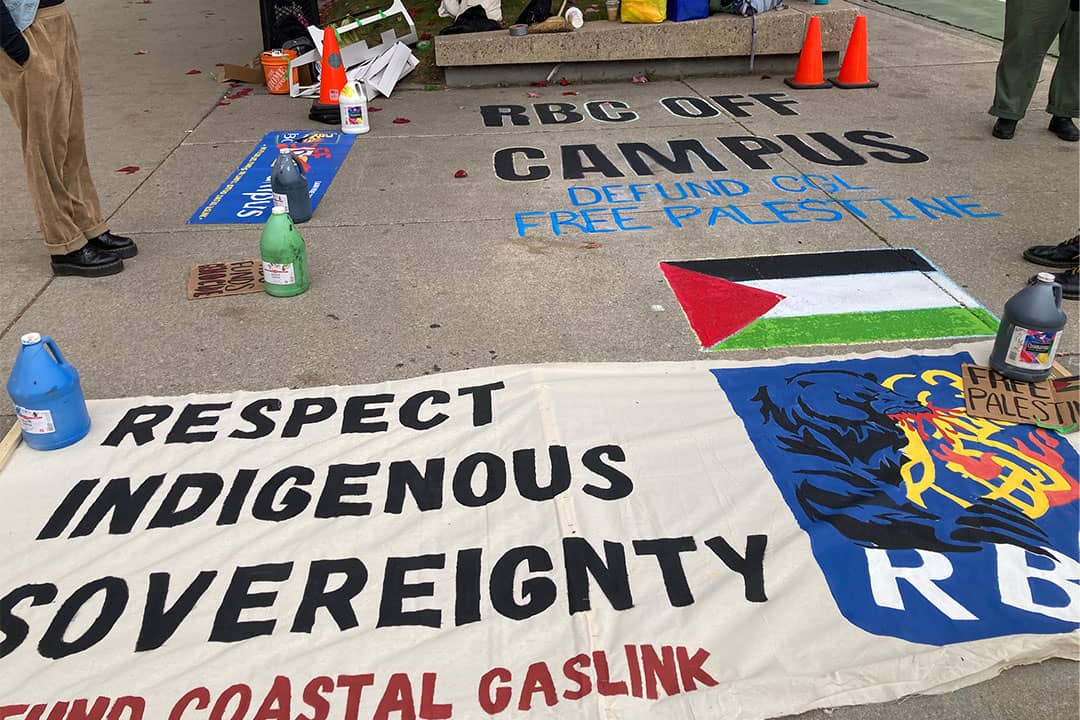On October 24, students at seven universities — including U of T — held events calling on the Royal Bank of Canada (RBC) to stop funding fossil fuel projects.
At U of T, as a part of the RBC Off Campus Day of Action, students from the environmental activist group Climate Justice UofT (CJUofT) painted a mural and held a banner outside of Robarts Library, demanding that the university sever its connections to RBC, which funds events, fellowships, and a building on campus.
In September, the University of Toronto Students’ Union (UTSU) joined eight other student unions in signing an open letter criticizing RBC. The letter called on RBC and other large banks to respect Indigenous peoples’ rights and stop providing financial support for fossil fuel projects.
Canadian student organization Change Course, which advocates against banks’ fossil fuel funding, coordinated the RBC Off Campus Day of Action. Students at seven universities located in Ontario and British Columbia held various kinds of events associated with the campaign, which included tabling and speaking with students.
U of T mural painting event
Around 2:00 pm, a group of approximately 10 students from CJUofT gathered outside of Robarts Library on the corner of St. George Street and Harbord Street. The students chalked an outline for the mural and then began painting. The students also handed out pamphlets and spoke to people walking by.
Kalliopé Anvar McCall, a fourth-year student majoring in diaspora studies with minors in gender studies and sexual diversity studies, said that CJUofT hosted the event to raise awareness of RBC’s role in funding fossil fuel projects as well as violating the rights of Indigenous people and Palestinians.
In 2022, RBC provided the most money out of banks worldwide to finance fossil fuel projects, according to the Banking on Climate Chaos report released by a coalition of environmental groups. RBC also invests in the Coastal GasLink pipeline, which crosses Wet’suwet’en land and has received opposition from the Wet’suwet’en hereditary chiefs, and the Trans Mountain pipeline — a project whose route is opposed by the Stk’emlúpsemc te Secwépemc Nation, whose unceded traditional land the pipeline crosses.
In a previous statement to The Varsity, an RBC spokesperson highlighted the bank’s commitment to achieving “net-zero lending” by 2050. The spokesperson also expressed the bank’s commitment to consulting with Indigenous communities and providing customers with ways to reduce emissions.
Anaum Sajanlal, a second-year majoring in history and critical studies in equity and solidarity, told The Varsity that most people passing by the mural seemed supportive but didn’t necessarily know about RBC’s involvement in the pipelines. However, they mentioned receiving some pushback related to the inclusion of the Palestinian flag and the phrase “Free Palestine” included in the mural.
The activists also highlighted RBC’s holdings in Palantir Technologies. In 2017, Israeli newspaper Ha’aretz reported that Palantir Technologies provided a predictive data analytics system used by the Israeli military to identify Palestinians who might be “[involved] in terror attacks.” Ha’aretz reported that the Israeli military made arrests and detained Palestinians who hadn’t committed any crimes based on Palantir’s predictions.
As of August 14, the RBC owned approximately 2.4 million shares in Palantir, valued at $37,115,113 USD as of October 26.
“Especially in this moment, I think showing solidarity with Palestinian liberation is so important,” Sajanlal said.
U of T criticism
U of T announced in 2016 that it had accepted a three million dollar donation from RBC to fund its ONRamp initiative — which provides workspaces, fellowships, and a speaker series to encourage entrepreneurship.
McCall said that U of T’s decision to accept donations from RBC gives the bank legitimacy. “Where you choose to put your money is basically who you’re choosing to side with, and right now, U of T is accepting a lot of money from RBC, and they’re basically choosing to side with colonial violence,” said McCall. “If U of T were to divest from RBC, it would send a clear message to the bank that this is totally unacceptable.”
UTSU signs open letter calling on RBC to divest from fossil fuels
In September, nine student unions based in Ontario, Nova Scotia, British Columbia, and Quebec — including the UTSU — released an open letter addressed to the CEOs of RBC, TD Bank, Scotiabank, Bank of Montreal, and the Canadian Imperial Bank of Commerce. The letter notes that these five banks financed more than $1.12 trillion in fossil fuel projects between 2016 and 2022.
The student unions, which collectively represent more than 450,000 students, called on the banks to stop investing in fossil fuel projects, stop funding the Coastal Gaslink and Trans Mountain pipelines, and respect Indigenous peoples’ right to freely determine whether projects can be built on their land.
“If these banks want to continue to receive students’ business, they will need to change their policies to reflect our values,” the unions wrote.



No comments to display.